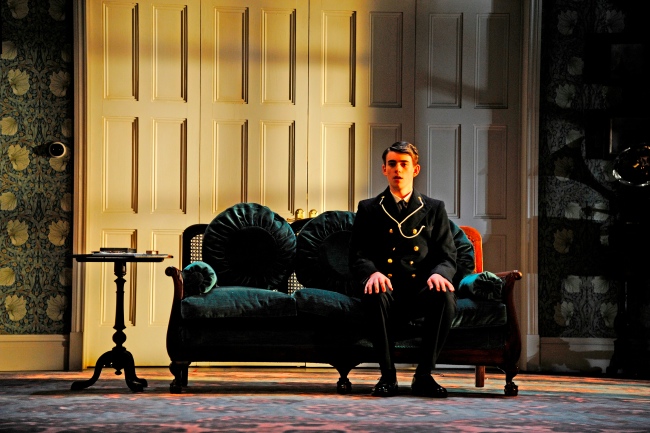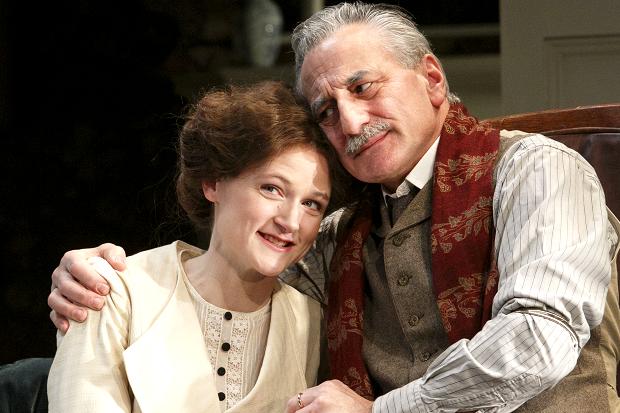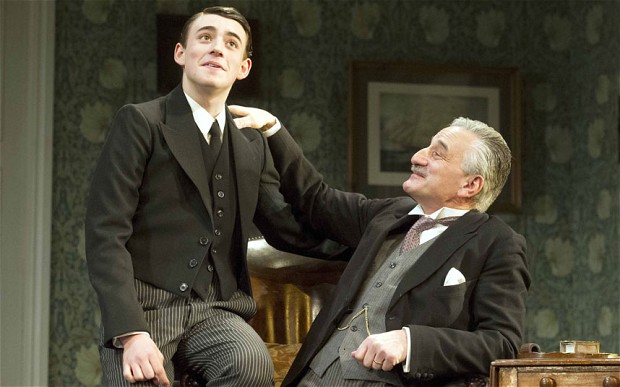Based on the real-life case of George Archer-Shee, Terrence Rattigan’s The Winslow Boy tells the story of 13-year-old Ronnie Winslow, who is expelled from his elite naval college on suspicion of stealing a five shilling postal cheque. In a plight to prove their beloved boy’s innocence, the wealthy Winslow family embark on a two year long fight to ensure that their case is brought to court.

In these austere times, fighting a financially crippling battle because of a petty crime seems rather an exaggerated familial reaction. However the themes within Rattigan’s drawing room drama resound pertinently in their current significance. The Winslow Boy is a drama of injustice which is made all the more relevant since we witness the steely determination of an ordinary individual – the boy’s father, Arthur Winslow – who stands up against the power of the Establishment. At a time when Tory politicians are considering scrapping the Human Rights Act, Rattigan’s call for integrity remains highly topical, despite having been written over 60 years ago.
Directed by Lindsay Posner, The Old Vic’s current adaptation of The Winslow Boy is a wonderfully subtle, technically-assured production. As the courtroom drama unfolds simply and elegantly within the confines of the family’s Kensington home, we are forced to see the human cost of the fight for justice. As the Establishment tries to overpower the family, the Winslows must pay dearly to prove the innocence of their Ronnie; over the course of the play, we witness Arthur growing gradually weaker, until in the final scene, the head of the family must metaphorically forsake his strength as his favourite chair is replaced by a wheelchair.
 There are excellent performances by the entire cast, yet it is Henry Goodman’s anguished and embattled Arthur that steals the show. Whilst his sharp witticisms provide much of the play’s humour, it is his vulnerability, pride and enduring love for his son that allow for poignancy. Naomi Frederick is excellent as the intelligent and principled suffragette daughter Catherine, who is prepared to sacrifice everything in pursuit of justice, whilst Peter Sullivan is grippingly good as the ferocious lawyer, Sir Robert Morton, who hides his decency behind a veneer of cruel narcissism.
There are excellent performances by the entire cast, yet it is Henry Goodman’s anguished and embattled Arthur that steals the show. Whilst his sharp witticisms provide much of the play’s humour, it is his vulnerability, pride and enduring love for his son that allow for poignancy. Naomi Frederick is excellent as the intelligent and principled suffragette daughter Catherine, who is prepared to sacrifice everything in pursuit of justice, whilst Peter Sullivan is grippingly good as the ferocious lawyer, Sir Robert Morton, who hides his decency behind a veneer of cruel narcissism.
Set against Peter McKintosh’s sumptuous Edwardian-style set, Posner’s rendition meanders at a slow and steady pace, and at times it drags. Aside from the fantastic scene in which Ronnie is gruellingly interrogated by Morton, the dialogue is measured in tone, and voices are rarely raised. However, this lack of excitement within the Winslow home cleverly reveals the emotional stoicism of a traditional middle class British family, who are tormented by their emotions and their outward desire for respectability. The result is often incredibly moving, and we empathise as the family struggles to restore honour and decency to their name. True, it’s not high drama, but the play’s nuances are what make Posner’s The Winslow Boy so thought-provoking and affecting.

As the court case gets under way, Ronnie Winslow is forgotten. He speaks rarely, falls asleep when his father reads articles about the case to him and is finally absent at the verdict of the trial. As his sister stipulates, Ronnie’s innocence or guilt becomes irrelevant, yet the trial’s significance is far-reaching in terms of the fundamental human principles it represents: equality, democracy and the liberty of the individual to speak out for the greater good.
The Winslow Boy at the Old Vic until Saturday 25th May 2013. Performance time approximately 2 hours and 2o minutes with one interval. For more information and tickets visit the website.



